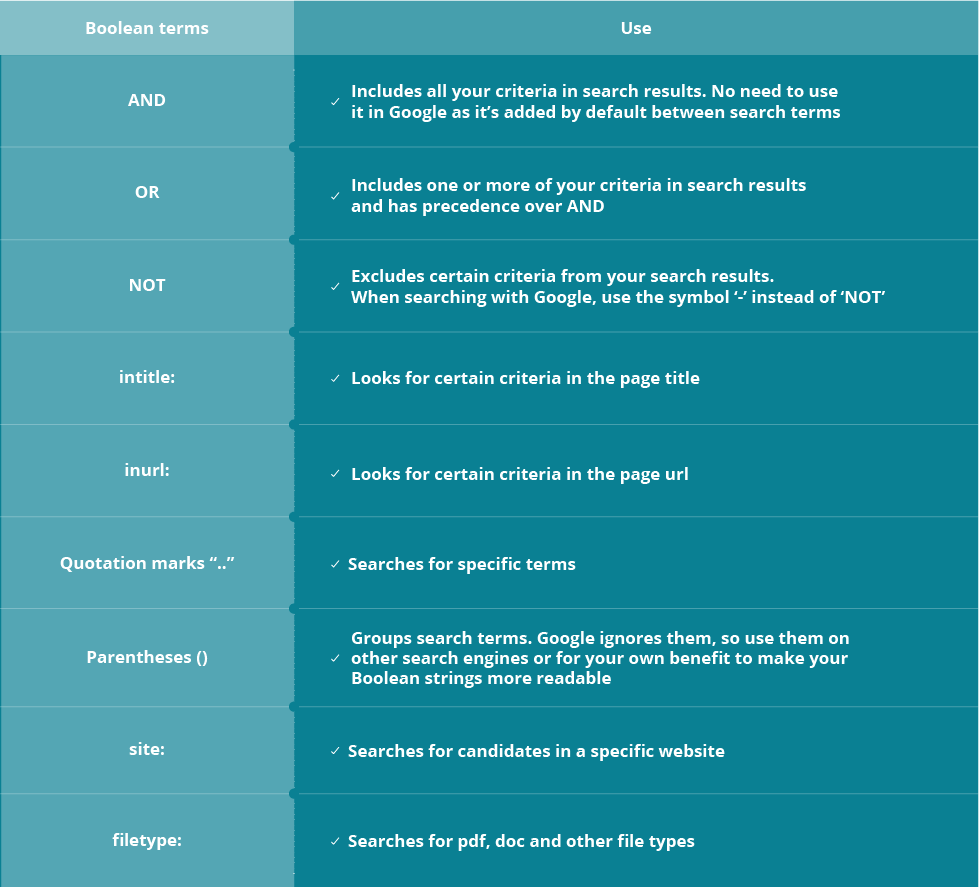How to find candidate resumes with Boolean search strings
When sourcing professionals online, social profiles alone may not provide a well-rounded view of someone’s skills and experience. Sourcing resumes with Boolean search helps you better evaluate passive candidates. And, if you already have a candidate in mind, use Boolean search strings to discover their resume on various platforms.
Modify our Boolean search string examples according to your needs.
When sourcing EU candidates, please refer to guidance on using social media for recruiting and collecting candidate information as per the General Data Protection Regulation, or GDPR.


How to find candidates’ resumes using a generic search string
To begin your search for professionals who have posted their resumes, craft parts of a generic search string to use in every search. This string should:
- Exclude irrelevant results. When looking for passive candidates, you may often stumble upon pages with job ads, sample resumes or resume services. All these are irrelevant to your search (false positives) and can be excluded using the NOT (“-”) operator. Add terms based on the irrelevant results you get each time:
-job -jobs -sample -examples -template

- Cover possible variations of the same profession. For example, not all developers call themselves “developer.” They may go by the title of “engineer,” “programmer” or “hacker.” Combine searches with the most common terms to cover more possibilities using the OR operator:
(“graphic designer” OR illustrator)
Sourcing resumes
Resumes are often called CVs too, so include this term in your search string. Most of the time, uploaded resumes will have the words “resume” or “CV” in the page title (a less common alternative is the word “bio.”) For this reason, use the command (intitle:resume OR intitle:cv) to generate relevant results:
(intitle:resume OR intitle:cv) (“graphic designer” OR illustrator) -job -jobs -sample -examples -template
To expand your search further, add a search for the words “resume” or “CV” in the page url:
(intitle:resume OR intitle:cv OR inurl:resume OR inurl:cv) (“graphic designer” OR illustrator) -job -jobs -sample -examples -template
Add skills you want candidates to have for more targeted search results:
(intitle:resume OR intitle:cv OR inurl:resume OR inurl:cv) (“graphic designer” OR illustrator) CorelDRAW -job -jobs -sample -examples -template
Search for resumes on particular sites
Some sites have an abundance of uploaded resumes. For example, Indeed, CareerBuilder and Monster provide candidate databases where you can use Boolean strings to search resumes. Also, use the site: operator to look for resumes of candidates who have the skills you’re looking for on other sites in Google:
- site:scribd.com (resume OR cv) developer -sample
- site:slideshare.net (resume OR cv) “java developer”
Look for resumes by words often included in resumes
Sometimes, professionals who post their resumes online don’t use the word “resume” or “CV.” In this case, search by including words that often appear in resumes, like “work experience” and “education.” Here’s an example:
(“graphic designer” OR illustrator) CorelDRAW (experience OR history) education -job -jobs -sample -examples -template
How to find candidates’ resumes in various formats
Sometimes, you need to find resumes in a particular format. For example, you may want a downloadable version of a resume or a resume in a format that you can upload to your company’s database. In this case, use variations of this string:
(intitle:resume OR intitle:cv) (filetype:pdf OR filetype:doc OR filetype:txt) (“graphic designer” OR illustrator) -job -jobs -sample -templates
Expand your search
Once you develop a search string to find resumes, add more terms to target your search results. Use our examples to look for resumes by role and skills. You could also look for resumes that mention a passive candidates’ location, phone number and email addresses.
Combine your search of resumes with combing social profiles to find the best candidates for your roles.